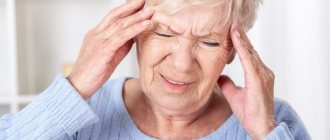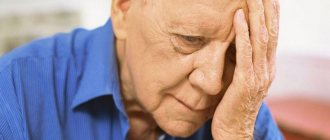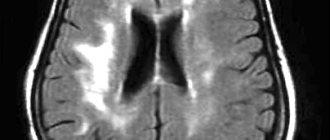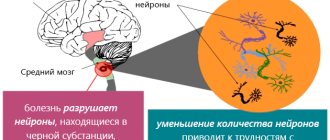From this article you will learn:
- Why does depression occur in older people and what are the risk factors?
- How does depression in older people differ from dementia?
- How to Diagnose and Treat Depression in Older Adults
- What are the consequences of depression in older people?
Old people... They are always dissatisfied, they grumble, you can’t please them. Sound familiar? But few people realize that our relatives simply need help. Depression in older people is not a condition of everyday life, but a mental illness, and the most common one today. One thing is good: she can be defeated, she will retreat with proper treatment. What can you do to prevent depression from affecting you or your elderly relatives and friends? What to do if signs of this disease appear? Could what we are seeing be depression? We hope our article will help you get an elderly person out of this state.
Why depression occurs in older people
“Not my day”, “a bad streak”, “I didn’t have a good morning”... There are many more excuses for the onset of depression. This is what psychologists began to call a long-term mental state of gloomy hopelessness. This mental disorder manifests itself in the loss of adequate perception of reality. Everything seems dreary, the mood is at zero. What used to make you happy is now annoying. You pushed your beloved dog away, were rude to your friends, you don’t want to move, everything is in black, pessimistic thoughts arise, crosswords, embroidery, violets on the window are abandoned, self-esteem is so low that you can only feel sorry for yourself. Some try to find solace in alcohol or other psychotropic substances.
What is associated with depression in adulthood? What pushes a person towards it?
- Let's start with the fact that older people react very painfully to everything. But this is not harmful, as many people think. What caused mild annoyance in youth can provoke depression and nervous breakdown in adulthood. Stress, severe fatigue, situations that cause various breakdowns greatly deplete the reserves of all body systems. He has difficulty adapting to stimuli. An elderly man has difficulty hearing, he has to constantly ask again, half of the words in a conversation pass him by. Finally, he begins to avoid communication and withdraws into himself.
- How will you feel if something constantly hurts or bothers you? Not fun, right? People of mature age, unfortunately, accumulate a lot of somatic pathologies. When visiting a doctor, an elderly person often hears: “What do you want? Age!". Illness, poor health, the attitude of doctors and others - all this can trigger the mechanism of depression. There are also pathologies in which older people are at increased risk. These are cerebrovascular diseases, diabetes mellitus, abnormalities in the thyroid gland, and arterial hypertension.
- Many people look forward to approaching retirement age with fear, but it is not physical weakness and illness that scares them. They are afraid of social isolation, since upon completion of their work activity the usual way of life changes sharply, and a feeling of unfitness and loss appears. It’s as if you fell out of a fast train at full speed and were left standing on an empty platform, watching the disappearing bright, noisy train. It was as if the illnesses were waiting and appeared immediately. Here, depression can overtake those who spent most of their lives at work or in their careers, and most often men. Elderly women adapt more easily to their new free status, finding themselves in dacha care, next to their grandchildren, and traveling.
- Another problem for older people is loneliness. Only recently in the evenings your place was noisy and crowded: work problems were discussed, children demanded care and attention, plans were made for the weekend with friends. But now the house is empty, the grown children have their own families and interests, and no one is waiting at work. Friends, also elderly people, are busy with their illnesses, remind of themselves less and less often, and some are no longer there at all. The social circle is narrowing, loneliness with gloomy thoughts is approaching. Elderly women endure this condition more difficult, since they are the center of the universe called “Family”. Single women, divorced or widowed, suffer from emotional emptiness.
- How tempting it can be to cure ailments with one pill! This opinion also exists in the treatment of depressive conditions. You feel sad - take the medicine, and now you are cheerful and full of strength. Such a dismissively easy solution to problems with depression only strengthens the disease. Taking medications, even as recommended by a doctor, can trigger another wave of distress. And even more dangerous is the use of antidepressants on the advice of grandmothers at the entrance or a neighbor in the country. Severe cases are known when treated with antihypertensive drugs (dicogsin, methyldop, beta blockers), corticosteroids (prednisolone), analgesics, and sleeping pills.
- Recommended articles to read:
- Social services for older people
- Diseases of old age
- Valuable tips on how to choose a boarding house
Depression in older people: who is first at risk?
Who is not at risk of depression, and who among mature people should think about:
- Elderly women. Men turned out to be stronger and more resistant to depressive disorders.
- Lonely people, because they sorely lack the attention of others and the care of loved ones.
- Alcohol abusers or those with experience of taking narcotic drugs.
- People who have suffered a serious illness or stressful situations, for example, a change of place of residence (they moved their old mother to the city, who had worked all her life in the countryside), who have lost relatives and friends.
- Having suicidal attempts.
- Sick elderly people. The focus is on hypertension, heart attack, diabetes. Such patients need to be given special attention.
- Those whose relatives suffered from depression of various types, or they themselves struggled with this disorder in the past.
- Elderly people with disabilities who have some visible defect.
If you have discovered the presence of at least one sign, then this is already a reason to think about it. If there are several of them, it is necessary to act so that your elderly relatives are not left without attention and care, alone in the face of a terrible disease.
How does depression in older people differ from dementia?
Externally, depression and dementia are very similar conditions, the main difference being that the first disease is reversible and therefore requires treatment. However, they can and should be able to be identified. Let's start with depression. It can affect memory, causing an elderly person to become absent-minded and lost in space.
Dementia (dementia) is a serious disease that affects the brain. By saying “of sound mind and sound memory,” we emphasize that it is absent. Indeed, for an elderly person it is important that with age, speech, attention, and the ability to accumulate, retain and reproduce existing knowledge and skills remain at the same level. Otherwise, his life will become very complicated: his habits will change (what he previously liked will cause disgust), his restrained character will become hot-tempered. Such people have difficulty caring for themselves and very often fall into depression.
Below is a table that gives a clear picture of the similarities and differences between dementia and depression (LJ Cohen, 1999).
| Parameters of mental state for which comparison occurs in parallel | Depression | Dementia |
| Affect (intense and short-term outburst of emotions) | Depressed (withdrawal). Deepening, soul-searching, escapism from reality. Severe subjective distress (destructive effect on the body). | With a violent manifestation. Labile, losing nuance (reacts sharply to both positive and negative stimuli). Lack of concern about one’s condition (a person does not care who he is or what he is). |
| Start | Fast, stormy. Can be precisely defined, contrasting. History of depression and other mental disorders (controlled). | Gradual, increasing. The temporary assessment is not defined, it moves from one state to another. The disorder was noted for the first time. |
| Flow | Short, repetitive. Rapid development of symptoms after the first case. | Long-term, gradual. Slow development with regression. |
| Behavior | Indifferent, does not respond to stimuli. Absolute passivity, so any action requires effort. Indifference to memory lapses. Refusal and loss of social contacts. Intensification of attacks in the evening and at night is not typical. There is no loss of cognitive function (memory, attention). | With a predominance of distractibility, preoccupation, head in the clouds. Fussiness, aimless performance of actions. The failure of memory is compensated by notes. Social contacts are preserved, but with changes. Attacks often worsen in the evening and at night. The behavior is comparable to the severity of cognitive dysfunction (memory loss, mental weakness). |
| Complaints | There are complaints of cognitive impairment | Complaints of cognitive disorders are often absent |
Depression in older people and its types
- If we are talking about congenital or acquired defects of the nervous system, then these are organic depressions.
- If the disorders are caused by traumatic events (problems at home, worries at work, loss of a loved one), then we are talking about psychogenic depression.
- If depression is detected in elderly people with diseases of the respiratory system, cardiovascular system, visual organs, or oncology, then it will undoubtedly be of a somatogenic nature. This type of mental disorder manifests itself especially often in medical institutions with long stays.
- Hereditary predisposition, internal pathogenic factors, with increased influence of external circumstances on them, give endogenous affective deviations ( bipolar and unipolar depressive disorders ).
- Long-term use of certain medications can lead to iatrogenic depression. There are opponents and supporters of this theory. In the same vein, we can talk about the body’s reactions to careless medical opinions.
Causes of depression in older people
Older people with an unstable (labile) psyche are more susceptible to depression than others.
The causes of depression can be very different, the most common among the elderly are aging, loneliness, loss of a loved one, retirement and, as a result, a feeling of uselessness, abandonment, separation from older children, and a change in financial situation. Most pensioners live on a low pension, which is not enough to cover everything they need, especially considering the high cost of medicines and treatment. And I don’t want to be a burden to my relatives (as the pensioners themselves believe)... Feelings of loneliness, injustice, resentment and deprivation plague older people and lead to a depressed state, which then becomes chronic. The causes of depression can also be secondary, resulting from other diseases (of the brain or nervous system as a whole), or from taking medications that have side effects on the central nervous system.
But one should not assume that depression occurs only in modern people. We know from literature that people have suffered from depression for many centuries.
Depression in older people and its signs
Depression in older people varies in symptoms. Older patients do not show emotional manifestations; they are often closed and withdrawn. Older people are more concerned about physical conditions, for example, fear of developing a disorder such as Alzheimer's disease.
Negative emotions, of course, do not disappear anywhere, but they look natural due to the lack of support and care of loved ones, disappointment in people, etc.
Let's try to understand the fears that are the main signs of approaching depression in older people:
- The difference between depression in a young person and an elderly person is that the latter lives in the past. If a void has formed around, then it is filled, most often, with negative memories, turning into a mental disorder that torments and torments the patient. The person replays the difficult situation over and over again, returning and multiplying anxiety and anxiety.
- Anxiety is an essential component of depression in older people. After comparing the research results, scientists confirmed this assumption. In the group of young people (under 35 years of age), only a third of those surveyed noted anxiety, and in the group of patients over 55 years of age, 70% confirmed the presence of anxiety, fears, and painful forebodings.
- It would seem that meeting the sun and the morning hours bring joy, but in the case of depression the opposite is true. The state of depression in elderly patients is especially noticeable in the morning and subsides towards evening.
- Depressed patients are characterized by slowness of movement and inhibited thinking. They are focused on themselves, on their inner feelings. It seems that these people are exploring their body from the inside, trying to figure out the problem of the origin of this or that pain.
- Indifference to the world around you, alternating with bouts of melancholy detachment are clear symptoms of a deep degree of depression.
Features of depression in old age
With age, the nervous system loses its adaptive capabilities and becomes depleted, so a person reacts more sharply to stimuli. Depression in older people occurs differently than in younger people. The situation is further complicated by the fact that in old age a person is often not inclined to analyze his experiences and share them with loved ones. He concentrates more on physical ailments, completely ignoring his emotional state. Added to this are fears of developing certain diseases, such as Alzheimer's disease or dementia, memory loss, decreased appetite, weight loss, sleep disorders, and ridiculous and disturbing ideas.
Emotional manifestations are pronounced, but logically explainable due to the loss of close relatives, the emergence of a feeling of uselessness, lack of support, and ambivalence of feelings. For example, old people are afraid and at the same time wish for the approach of death. A cheerful and active person is constantly at home; if he needs to go out somewhere, he gets nervous, a feeling of weakness and insecurity overcomes him. All these symptoms can also appear in healthy people in old age; the main thing is to distinguish depression from temporary mood swings. Depression is dangerous due to the risk of suicide, which happens quite often if measures are not taken in time.
Risk factors
Factors that influence the development of mental disorder in old age:
- Lack of support from others or its absence;
- Loneliness (more difficult for widowers or widowers);
- Female gender (women are more likely to be depressed than men);
- Stressful situations (moving, changing housing, losing friends or relatives);
- Diseases (heart attack, high blood pressure, dementia, cancer, diabetes, etc.);
- A history of depression or a genetic predisposition;
- The presence of an external defect (amputation of limbs, consequences of a stroke);
- Taking medications (especially steroids, analgesics, antihypertensive drugs);
- Suicide attempts in the past;
- Use of drugs or alcohol.
The presence of one or more factors significantly increases the development of depression in older people. Relatives need to closely monitor the mental well-being of loved ones in old age in order to prevent depressive disorder.
What are the clear symptoms of depression in older people?
What should we be wary of, what should we pay attention to?
- For a depressed elderly person, everything is bad: prices are rising, cars are only trying to splash mud, the rain is wet, the sun is hot. Constant criticism, irritation, dissatisfaction with oneself, with you, apathy - the patient will explain all these changes in mood reasonably, but will not even allow the thought of a possible pathology of his nervous system.
- Going somewhere or doing anything is problematic for an elderly person. A routine routine visit to the hospital causes a storm of indignation in a patient with signs of depression. Another symptom is decreased activity and loss of social contacts.
- He gets up at night, wanders around, reads magazines, falls asleep in the morning, frustrated all day. There is no appetite, even your favorite buns with a crispy crust are not delightful. Sleep disturbance and loss of appetite in an elderly person are the third sign of incipient depression.
- He has difficulty remembering why he has a pencil and notepad in his hand, why he took a calendar, and does not go to the store without a list of two products. Of course, this can happen to anyone, and perhaps an older person only has senile dementia, but it is also a symptom of a mental disorder.
- During periods of depression, older people most often complain of feeling unwell. About 90% of all patients showed signs of deteriorating health.
- Even from a closet full of clothes, you will not be able to throw out a single torn sock. You will hear that you are taking away the most necessary things from an old sick person, leaving him in poverty. The acquisition of new useful things also causes indignation and indignation: why buy an electric kettle if you can get by just fine with a jar with a boiler? Pathological hoarding is another sign of depression in older people. But it should not be confused with reasonable frugality.
- They opened the window - you want to catch a cold, they closed it - it made it stuffy, they asked what should be done - they blamed everything on him, they didn’t ask - no one is interested in his opinion. This is not harmful or a test of your nerves. This is a conversation, attracting attention, an opportunity to spend more time with you. Accusations from an elderly person against their loved ones is a rather acute and conflicting problem. Here you need to be patient, because it is unknown how depression will treat you and how lenient your family will be.
Preventing depression in older people
When an elderly person comes to the appropriate medical institution for help, he is provided with the necessary therapy by specialists in certain areas, including a cardiologist and rheumatologist. However, most often, depression is not easy to diagnose during an initial consultation, and therefore not all patients can receive the required treatment. Often, the manifestations of depression in older people are completely ignored, since its symptoms are very similar to other problems that arise in elderly patients.
How to lift an elderly person out of depression and prevent its negative influence?
Stick to a proper diet.
It is important to follow the following rules:
- Include a variety of foods in your diet, especially plant-based foods.
- Eat bread, flour products, cereals, and potatoes several times a day.
- Eat more fresh fruits and vegetables, eat them throughout the day (daily intake is at least 400 g). It's good if they are grown in the area where you live.
- Keep your dietary fat intake under control; its content should not exceed 30% of daily calories. We advise you to include vegetable oils in your diet instead of animal fat.
- Instead of fatty meats and meat products, eat legumes, grains, fish, poultry or lean meats.
- Include low-fat milk in your diet, and try to consume dairy products, including kefir, sour milk, yogurt and cheese, which are low in fat and salt.
- Give preference to products with low sugar content. Limit the amount of sweets and drinks containing sweeteners you eat.
- Watch the amount of salt you consume, it should not be more than one teaspoon - 6 grams per day. It is better to choose iodized salt.
- When drinking alcoholic beverages, remember that the total alcohol content in them should not exceed 20 g per day.
- Choose cooking methods that will keep your food safe. For example, steaming, microwaving, baking or boiling foods can reduce the total amount of fat, oil, salt and sugar.
It is important that the diet is varied and contains mainly products of plant origin. They contain biologically active substances and dietary fiber (fiber), which prevent the occurrence of chronic diseases, especially cardiovascular diseases and cancer.
An elderly person should eat at least 400 grams of fruits and vegetables per day. This recommendation has a scientific basis, confirmed by epidemiological studies. According to the data obtained, people who consume 400 grams of fruits and vegetables daily are less likely to suffer from cardiovascular diseases, certain types of cancer, and do not experience micronutrient deficiencies. Fruits and vegetables contain many vitamins, fiber, microelements, and antioxidants.
Ensure adequate sleep.
It is important to go to bed no later than 22–23 hours. It is during this time interval that the body is relaxed, the nervous system is in a calm state, so there are no problems with falling asleep. An elderly person needs to sleep about 7–8 hours. Often older people suffer from insomnia, so in order to fall asleep faster and easier, it is recommended to take a walk in the fresh air before bed.
We recommend
“A set of exercises for older people: body and breathing” Read more
Moderate physical activity.
To maintain body weight within the required limits (in accordance with the body mass index), you need to devote time to moderate physical activity every day. The options can be very diverse: a walk in the park, exercise, playing with children or grandchildren. You can also join a Nordic walking class or go swimming. By attending sports training you can make new acquaintances.
Try to live a full, active life.
Don’t forget to meet with friends, spend quality time for yourself, travel, visit museums and theaters. There is no need to focus on age, because this way you will be able to avoid depression.
It is important to emphasize that caring for the health of older people must be included in the group of priority tasks implemented by the rule of law. Today, unfortunately, not all retirees can live in such a way that they have enough money for travel and sports.
It will be possible to raise the level of mental health of older people if we actively promote a healthy lifestyle and healthy aging. Try to be closer to your family and friends, do not refuse help and, if possible, offer it yourself.
How is depression diagnosed in older people?
Reading these lines, many older people will confidently say: “This is not my case” - and they will be right. Diagnosing depression is very difficult. It appears and disappears again. Doctors cannot determine the presence of this disease using tests; they will only show the physical condition of your body. Therefore, to diagnose depression in older people, a simple but at the same time effective method is used - conversation, conversation.
A specialist determines the presence of pathology using several methods:
- Hospital Anxiety and Depression Scale.
- Beck scale.
For self-assessment, you can use the Zung scale. Tables using this method are filled out by the patient himself, which confirms the accuracy and subjectivity of the results. An elderly person with signs of depression needs to honestly answer questions about the frequency of anxiety, obsessive, difficult thoughts, appearance, and favorite activities. These are simple multiple-choice questions, the sum of which provides an explanation of the condition.
If the severity of the disease requires treatment and monitoring, doctors use the Hamilton Depression Rating Scale (HDRS) and the Manngomery-Asberg Rating Scale (MADRS).
Consequences of depression in older people
Consistently bad mood, lack of motivation for any kind of activity, painful dulling of thinking abilities - the main characteristics of depression - slowly but surely lead a person to a noticeable deterioration in health. First of all, the cardiovascular system suffers: coronary heart disease develops and progresses, and the risk of heart attack increases. Elderly people with depressive and depressive-anxiety disorders do not want to follow doctors’ recommendations, do not strive to recover, and may experience suicidal thoughts. In other words, depression in old age can hasten death. Therefore, it is so important to notice the first signs of this disease in time and take drastic measures to help eliminate it. It is much easier to do this in a private nursing home. In boarding houses where older people are treated warmly and sincerely, depression does not occur.
Depression in older people – treatment is possible!
Alleviating the course of the disease in a patient with depression and direct therapy is a rather complex process. Why? Because an elderly patient rarely agrees to admit his diagnosis, but if the pathology is not treated, it will break the person both morally and physically. As a rule, older people are afraid of being branded abnormal and being isolated. Success is possible if a trusting relationship has developed with the doctor, and the patient longs for recovery and is ready to follow all the doctor’s instructions for this purpose. Treatment consists of three components: replacing your lifestyle with a healthy one, medications, and working with a psychotherapist. Many people also add traditional methods here. More about all this below.
Treatment with traditional methods
Some people trust natural herbs, infusions, and decoctions more than synthesized drugs. Of course, folk remedies do not give side effects and are not addictive, but before using them you should definitely consult a doctor. This is very important when treating elderly patients.
Here are the most popular recipes :
St. John's wort for depression
St. John's wort is an excellent natural antidepressant. Infuse 20 grams of St. John's wort and the same amount of dried oregano into alcohol (250 ml). Add coriander seeds and thyme. After two weeks, take the tincture out of a cool, dark place and strain. We begin to take a drop a day, gradually increasing the dose to a teaspoon, washed down with water.
Calming infusion of mint and lemon balm
You need to mix two types of herbs. Then you need to take a tablespoon of their mixture and pour a glass of boiling water. Let cool and brew. We drink the resulting broth in the morning, afternoon and evening, dividing this glass into three parts.
Motherwort and valerian
These folk remedies are considered leaders in relieving nervous tension. Motherwort and valerian are sold in every pharmacy. The dosage is indicated on the packaging.
St. John's wort, rosemary, lemon balm and blueberry
Four types of grass are taken in equal parts. One tablespoon of this entire mixture is poured with boiling water and brewed for half an hour in a glass. After which the infusion is drunk with honey, like tea.
In addition, decoctions of chamomile, fennel flowers, anise, and lavender have a good calming effect. They can also be purchased at the pharmacy. Brew and drink like tea.
Medications for depression in older people
It’s great if depression has subsided after using folk remedies, but sometimes the use of medications is required. Modern antidepressant complexes are at your service here. These are long-familiar tricyclic and tetracyclic drugs. Improved antidepressants that block side effects have also appeared on the market - selective serotonin reuptake inhibitors and reversible MAO-A inhibitors.
Effective drugs help overcome the disease, but when prescribing them, it is worth taking into account the individual characteristics of each patient. The correct dosage and compatibility with other dosage forms are more than important when treating an elderly person.
The most popular antidepressants for older people today are:
- Atarax . This antidepressant is good because it is not addictive or dependent. It is effective for anxiety disorders that occur against the background of neurological and mental illnesses. Supports the functioning of the nervous system.
- Leviron. One of the safest drugs for elderly patients. Why? Because it provides a pronounced sedative effect. Can be used for all types of depression.
- Melipramine is prescribed to increase the mental and general tone of the body, motor activity and mood. Indications are depression, accompanied by apathy, melancholy, sleep and appetite disorders.
- Tsipramil is suitable for use in the presence of concomitant somatic diseases, suitable for long-term use, and has sedative and antidepressant effects.
But that is not all. Sometimes doctors prescribe nootropics, antihypertensives and antispasmodics that block panic attacks and unreasonable anxiety.
Another fact confirming the need for therapy under the supervision of a doctor is that, to be on the safe side and out of habit, elderly patients often take Corvalol or Valocordin before bed, which should not be done. These drugs not only interfere with the action of antidepressants, but can also cause a deterioration in well-being.
Psychotherapy
Only in films do we see how a psychotherapist accepts a patient and helps him get out of the crisis. In real life, older people are categorically against such treatment methods, but, having yielded to the persuasion of their relatives, many of them are convinced of the effectiveness of the practical help of a specialist. The consequences of depression are successfully corrected through a whole complex of cognitive-behavioural, interpersonal and family psychotherapy for elderly patients.
Electroconvulsive therapy
What to do when time is lost and neither medications nor a psychotherapist help? Depression destroys an elderly person, there is a threat to life, have there been any suicide attempts? Electroconvulsive therapy, otherwise called electroconvulsive therapy, is a method of psychiatric and neurological therapy in which, in order to achieve a therapeutic effect, an electric current is passed through the patient's brain, which causes a seizure.
Electroconvulsive therapy for the treatment of nervous disorders has been around for a long time. She has been saving the lives of elderly patients with severe depression for more than 70 years. This method of biological stress remains one of the most relevant means and is a worthy alternative to psychopharmacotherapy.
Treatment of depression in older people
There are different treatments for depressive disorder in the elderly. An integrated approach is considered optimal, which includes psychotherapeutic work (interpersonal, family and cognitive behavioral psychotherapy), electroconvulsive therapy, and antidepressants. Medicines are varied and effective, but in any case they must be selected individually. It is necessary to take into account the presence of other diseases in the patient, and information about the drugs that the person is currently using in order to analyze whether these drugs can be used at the same time. This is also necessary to understand the risk of complications and whether the side effects are significant.
Prevention of depressive disorders
It is easier to prevent any disease than to treat it. Old age can be a pleasant and joyful period if a person feels the care and love of loved ones. Elderly people like to feel needed, which directly depends on their relatives. It is necessary to monitor whether doctors’ orders are being followed and whether there are changes in the emotional state and behavior. Encouragements in the following actions have a beneficial effect on the situation: 1. Communication with friends, peers, like-minded people (the main thing is that the person is not left alone); 2. Light physical activity (video lessons, walking, training for the elderly); 3. Health monitoring (blood pressure monitoring, visiting doctors, taking tests).
How to help an elderly person get out of depression
Only the comfort and warmth of home will help an elderly person overcome his illness. The attention of the whole family and care, words of gratitude and praise for help in housekeeping are priceless in the treatment of this serious illness. The patient must constantly feel the care and support of adult children and grandchildren, his importance and necessity for people dear to him. Old age can be a joyful period in a person’s life if he sees his importance and feels love from relatives.
Older people need constant encouragement. There is nothing warmer than words like these: “You did some difficult exercises today!”, “What beautiful embroidery!”, “Can I sit next to you and watch?”, “How does this blouse suit you, you look 10 years younger!” Sincere interest in their past has a very beneficial effect on patients. You will discover many amazing facts from your family history. Ask the older person to tell about his relatives, childhood, places where he lived in his youth, past work, interests. You will be amazed at what an amazing, heroic and at the same time humble person lives in the next apartment. Your admiring glance and shown interest can create a miracle. It is very good to look together at old photographs of the places where a person was born, lived, and worked, especially those in which he is depicted in strength, while performing socially significant work. This always improves self-esteem. At the same time, older people must feel your interest.
Symptoms of depression in the elderly
Relatives often do not immediately notice that a person is developing depression, since this process is quite slow. The clinical picture may begin with a constant feeling of malaise and depression, based on groundless worries about the state of health. At the same time, the patient mentally regularly returns to the past, thinks that he is a burden to his family and has achieved nothing in life, and loses self-respect. At the same time, the old person usually claims that everything is fine with him and he does not need treatment for depression that occurs in the elderly.
Most often, such people complain about:
- general loss of strength;
- apathy;
- constant fatigue;
- Bad mood;
- lack of appetite;
- poor sleep or insomnia.
Be attentive to your loved ones in old age. Especially for those who are trying to isolate themselves, refuse any communication or previously interesting activities. These are the first signs of depression, for which you should seek professional help.
Depression in older people and its consequences
Not treating depression in older people is inviting disaster. This pathology significantly shortens the patient’s life and can lead to heart attack, coronary heart disease and other cardiovascular diseases. Depression can trigger type II diabetes. Such patients poorly comply with the treatment regimen for the underlying disease and do not maintain close contact with the doctor. Elderly people do not enjoy the new day, they are increasingly visited by thoughts about the end of life, and they find it difficult to concentrate. If depression is left without treatment, relationships with loved ones will deteriorate due to the patient’s increased anxiety. Due to frequent scandals, misunderstandings of the problem, reproaches and worries, it will be bad for both him and his family. In an elderly person, feelings of guilt and loneliness worsen, suicidal thoughts appear, and a desire to rid loved ones of oneself as a burden appears.
Symptoms
The clinical picture is variable. People of early retirement age show the same signs as younger patients. There is a decrease in mood, physical and mental inhibition. In older people, depressive disorders are often accompanied by atypical symptoms and are not recognized by others.
Sudden mood swings, constant loss of strength, decreased energy levels, and loss of previous interests should alert you. Apathy, irritability, causeless aggression, and tearfulness are possible. A characteristic feature of depression in the elderly is an abundance of somatic complaints that do not correspond to the real state of health.
Some patients become obsessive, while others, on the contrary, withdraw and appear indifferent. Unfounded reproaches and complaints about memory impairment are common. Mental and emotional disorders affect the physical condition. Patients sleep poorly, eat little and irregularly, and lose weight.










